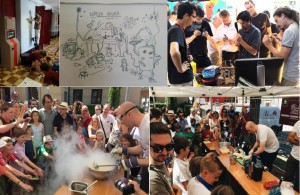Fablab
![]()
![]()
Hands on building of (almost) anything. Prototyping, finished products and repairs. With digital fabrication machines from 3D printers to lasers to large format CNC machines.
A Fablab is a space for learning new skills and sharing your skills. We do not have resources to fix things for free, but will happily show you how you can learn to repair and make things. To find out more, visit us on one of our regular open days.
So far we've had projects including Art & Design, Prototypes & Repairs, Furniture & Decoration, Electronics & Automation, Experimentation & Research, Robotics, along with DIY & Education. If you're not sure where to start, we even have group projects where you can learn with others.
You don't have to start from zero. Come and learn how about the world of digital fabrication with our regular training courses. Our introduction courses are suitable for everyone, with reduced prices for Pangloss members!
We have a range of different machines in the fablab, suitable for different types of project, from hobbyist to professional. To use one of our machines, you will need to be a member of the association. We do not (yet) sell material for making your projects, but may have small scrap/leftover pieces for testing. Before reserving a machine, you will need to be trained in one of our training courses. Use of machines is on a first come first served basis and requires payment. Hand tools, table saw, scroll saw, drill press etc are available in the space and are free for members to use. Fees are displayed in the fablab and, for members, on the appropriate web page, but start at €2/hour for filament-based 3D printers.
What is a fab lab?
Fab labs are a global network of local labs, enabling invention by providing access to tools for digital fabrication
What’s in a fab lab?
Fab labs share an evolving inventory of core capabilities to make (almost) anything, allowing people and projects to be shared
What does the fab lab network provide?
Operational, educational, technical, financial, and logistical assistance beyond what’s available within one lab
Who can use a fab lab?
Fab labs are available as a community resource, offering open access for individuals as well as scheduled access for programs
What are your responsibilities?
safety: not hurting people or machines
operations: assisting with cleaning, maintaining, and improving the lab
knowledge: contributing to documentation and instruction
Who owns fab lab inventions?
Designs and processes developed in fab labs can be protected and sold however an inventor chooses, but should remain available for individuals to use and learn from
How can businesses use a fab lab?
Commercial activities can be prototyped and incubated in a fab lab, but they must not conflict with other uses, they should grow beyond rather than within the lab, and they are expected to benefit the inventors, labs, and networks that contribute to their success
 .
Also a great opportunity to meet with our friends from all parts of Switzerland.
.
Also a great opportunity to meet with our friends from all parts of Switzerland.